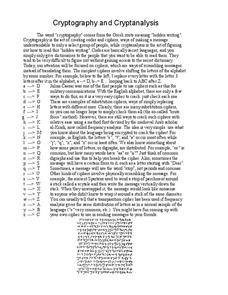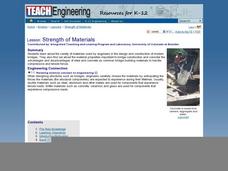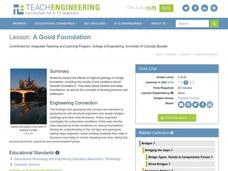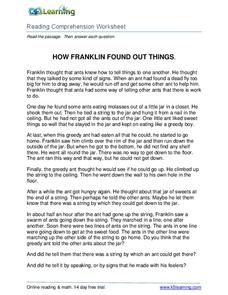Curated OER
Cryptography and Cryptanalysis
In this cryptography and cryptanalysis worksheet, 8th graders read the explanation and example for codes and ciphers, then answer 2 questions and decipher 2 messages.
Curated OER
Favorite Subjects
In this favorite subjects learning exercise, students complete 2 tables by following the clues for missing pieces of information for 2 different classes. Students fill in 6 missing places to the chart.
Curated OER
Kids Astronomy
In this astronomy word scramble worksheet, students examine the 16 letter groupings and use the decoder to help them reveal the 16 astronomy terms listed at the bottom of the worksheet,
Curated OER
Leveled Problem Solving Finding Outcomes
In this finding outcomes practice worksheet, students sharpen their problem solving skills as they solve 6 story problems.
Curated OER
When is Your Animal Most Active?-- Class Bar Graph
In this science and math instructional activity, a group of learners participate in graphing what time of day their chosen animals are most active. Students fill out the bar graph choosing day or night.
Curated OER
Backyard Bugs!
In this science and math worksheet, 2nd graders think of different ways they can sort bugs that are given to them in a bag. They complete a graph in which they sort the bugs with stripes, spots and solid colors.
Curated OER
Name Scramble: African Ungulates
In this language arts and science worksheet, young scholars analyze 10 pictures of African ungulates (hoofed animals) with scrambled names. Students decipher the names and write them correctly under each picture.
Fluence Learning
Writing About Informational Text: Beyond the Beyond—Galaxies
Everyone has a different point of view, even when it comes to the enormity of the universe. Two separate text passages explain the scope of a galaxy, prompting young readers to write an essay about each author's argument and how the...
Teach Engineering
Can You Resist This?
Some things are hard to resist. Small collaborative groups build circuits and calculate the voltage using Ohm's Law. Budding engineers explore the connection between the voltage across different resistors and linear...
Teach Engineering
Strength of Materials
Pupils examine a stress-strain diagram that compares the advantages and disadvantages of the two common bridge building materials, concrete and steel. The also consider the factors that influence the materials builders choose for their...
Teach Engineering
Edible Rovers (High School)
Design and build a rover ... then eat it? This activity has groups of two design and build Mars rovers. The teams determine what instruments they want to include with their rover and plan a budget. They calculate the cost of the body of...
Teach Engineering
A Good Foundation
It takes a strong foundation to build a house and a stronger one for a bridge. This resource presents the effects of geology and soil on bridge foundations. Working in groups, the class investigates the interaction of shallow and deep...
K5 Learning
Changes
You can't unring a bell, but can you unmelt an ice cube? Readers consider reversible and irreversible changes with a short informational reading passage and accompanying comprehension questions.
Geophysical Institute
Latitude and Longitude with Google Earth
Travel the world from the comfort of your classroom with a lesson that features Google Earth. High schoolers follow a series of steps to locate places all over the earth with sets of coordinates. Additionally, they measure the distance...
K5 Learning
The Astronomy Project
A passage about an astronomy lesson may leave readers starstruck. Fifth graders read about a class's exploration into the makeup of the galaxy and its constellations before answering six questions about the terms and vocabulary...
K5 Learning
Space Based Astronomy
How much astronomy can you study with the naked eye? Learn more about the ways scientists explore the galaxy with a short reading passage and set of short-answer questions.
K5 Learning
Rocks
Five short answer questions follow an informational reading passage that details the three different types of rocks—sedimentary, igneous, metamorphic—and their rock cycle.
K5 Learning
Why Does the Ocean have Waves?
Six short answer questions challenge scholars to show what they know after reading an informational text that examines waves—what they are, what causes them, and how different Earth factors affect their size and strength.
K5 Learning
Will the Wolf
How well can a wolf survive without a pack? Third graders read about headstrong Will and his desire to be an independent wolf with a short story and series of comprehension questions.
Teach Engineering
Earthquakes Living Lab: Finding Epicenters and Measuring Magnitudes
Pairs use an online simulation to determine the epicenter and magnitude of an earthquake. Using real data about the earthquake's maximum S wave amplitudes, they then determine the magnitude. The resource provides a great career...
Scholastic
Marijuana: Perception of Harm vs. Use
Many teenagers don't believe that marijuana is harmful, but if they do, it affects whether they use it or not. Analyze the relationship between what high school seniors believe about marijuana and their tendency to use it with a reading...
K5 Learning
How Franklin Found Out Things
Franklin learns about the world by making observations, and so do we! A short reading assignment prompts fourth graders to answer comprehension questions about a curious boy and what he notices.
Curated OER
Paper Helicopters
In this helicopter activity worksheet, students construct a paper helicopter and learn how weight, size and shape affect the way the helicopter spins. The activity outline includes background information, trigger questions, helicopter...
Curated OER
Solving Positive and Negative Numbers
In this positive and negative numbers worksheet, students solve 60 problems in which integers are added or subtracted. There are no hints or examples.
Other popular searches
- Math and Science Careers
- Integrated Math and Science
- Science and Math
- Science/ Math Games
- Math and Science Activities
- Integrating Math and Science
- +Math and Science Careers
- Math and Science Plan
- Math and Science Lessons
- Word Origins Science Math
- Math in Science Experiments
- Science Math























